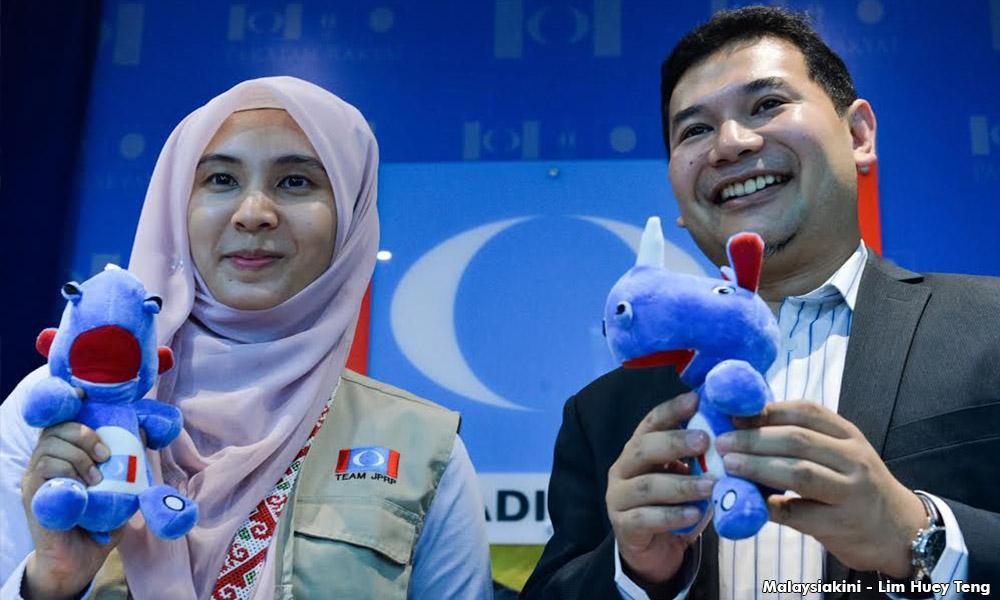COMMENT | When I tweeted that Nurul Izzah Anwar would "retract" her resignation, and come back "stronger," my view was interpreted erroneously as trying to speak on her behalf.
If my sincere intention to see her back at the fore of national reforms was not enough, allow me to pen some of my humble thoughts. Perhaps, just perhaps, she can see what I had meant by my tweet.
In my tweet, sheer moments after her bombshell resignation, I was articulating a view where she would be at the front and centre of Malaysian reforms or politics post May 9.
Thus, my belief why Nurul Izzah must be back. The latter is a gentle note. Not an adamant insistence, as anything blunt can only be misconstrued as "mansplaining", which is the attempt of a man to look down on a woman, which I harbour no such intent, especially towards Nurul Izzah, whom I have grown to admire for her reformist credentials bar none.
First of all, Nurul Izzah, like any other politician, does have her right to exercise the choice to stay or leave. This is akin to whether a voter is willing to cast his or her ballot, or to stay on the sidelines.
To my knowledge, Nurul Izzah has never been one to support the "Spoil Your Vote" campaign, as an expression of frustration. Yet by opting to leave all her positions in the federal government, including state chief of her own party in Penang, she seems to have waded into unknown territory.
There are detractors in her party who have begun the campaign to urge all "to respect" Nurul Izzah's decision. This is quaint. Nurul Izzah has consistently emerged as the most popular vice-president of PKR on three separate occasions.
She has been a giant killer at the parliamentary front, too. Without her, Sharizat Jalil, the Wanita Chief of Umno, would not have been held accountable for the National Feedlot Corporation scandal.
Nurul Izzah’s teaming up with Rafizi Ramli to expose the Cowgate scandal, to this day, is unparalleled in its success.
Instead of asking her to stay, Nurul Izzah’s nemesis seem to be asking all to respect her decision to leave. Naturally, I disagree with this.
Her resignation must not be the template on which post May 9 reforms proceed. Why? Pakatan Harapan began on a strong note precisely due to top leaders like Nurul Izzah.
Thus, Nurul Izzah should not exit the system where her voice is stronger within. If anything, she should be cultivated to grow. A stronger and better cabinet depends on having someone of Nurul Izzah’s calibre.
Secondly, countries, not just individuals have opted out of major events before. Almost always they are weaker outside of the international system as compared to when they were in.
For example, the United States’ decision to opt out of the Paris Accord. How can this decision improve the environmental welfare of the United States?
Thirdly, staying out makes sense if politics has become extreme. But DAP is staging its stake in 15th general election in 2023, based on the concept of "middle ground".
In other words, it believes the Malaysian economy can flip and change for the better.
This is a strategy straight out of the play book of contemporary Taiwanese politics. The Kuomintang party made a comeback, winning 15 cities out of a total 22 cities in Taiwan.
Consequently, Kuomintang, the party in charge of the 15 cities, is now poised to win the presidency of Taiwan once more in 2020 according to BBC.
Kuomintang's strategy is based on capturing the largest number of voters who neither believes in full independence from China nor complete integration with China. A Middle Taiwan, so to speak. The bulk of the voters want peace and prosperity.
A Middle Taiwan does have a strong and hot economy. DAP believes that the "middle ground" in Malaysia is full of voters, especially in the B40 categories who just want to have a better life.
If Nurul Izzah leaves all posts, including TVET (Technical and Vocational Education and Training), especially when graduates of TVET can be sent to Japan, where the burgeoning economy requires 500,000 workers between 2019-2025, then she would be relinquishing a key opportunity to help Middle Malaysia grow, and make Pakatan Harapan stronger. Indeed, it’s a role that might ultimately show what she is capable of, both as a reformist leader and practical problem solver.
Thus, while leaving is her right, it should not be an option. The Malaysian economy may remain stagnant but the Japanese economy can grow and is growing.
Fourth, even if the resignation is due to her unhappiness over defections coming from a crumbling Umno, the system is being set up for her to challenge and vet the incoming candidates. Even Bersatu is planning on creating a committee to vet them.
If her resignation is due to her frustrations within certain recent events or challenges within her party, then, Nurul Izzah is more effective, working within, rather than outside.
Nurul Izzah is an experienced and seasoned reformist, whom Malaysians of all ages look up too. By resigning, she may yet be preparing to inspire more Malaysians to put their candidates to greater scrutiny.
By not resigning, she has a say on how those metrics and standards of vetting can be tabled.
All top sportsmen and women have deployed the “R word” before, only to make a successful comeback. This applies to Dr Mahathir Mohamad himself.
If Nurul Izzah wants to transcend the return of any reigning politician, her job is better than from the inside, rather than out.
And for the avoidance of any doubt, I am not speaking on behalf of Nurul Izzah or anyone.
It is strictly my view that such a precious reformist like Nurul Izzah must stay in the frontlines of reform battle lines rather than being in the background.
It is my ardent hope and many of the true patriots of Malaysia, that the Reform Princess will reconsider her decision for greater good of the nation and the reform agenda after taking some time to rethink and reflect.
RAIS HUSSIN is a supreme council member of Bersatu. He also heads its policy and strategy bureau.
The views expressed here are those of the author/contributor and do not necessarily represent the views of Malaysiakini.



